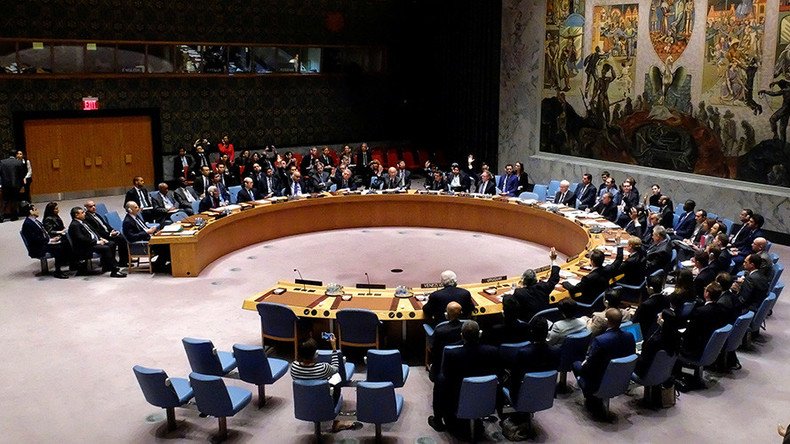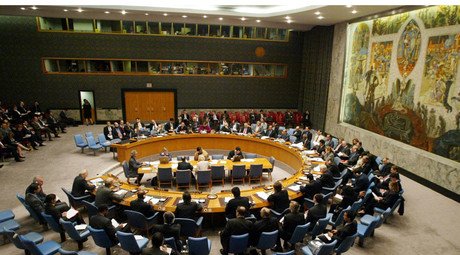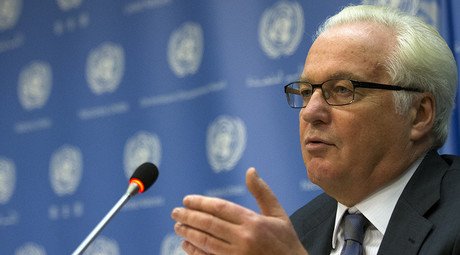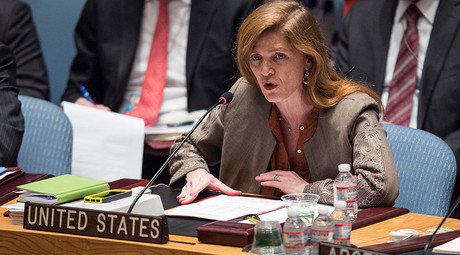Veto right prevents UNSC from turning into 'rubber stamp' for US & allies – Churkin

The right of veto in the UN Security Council serves as a cornerstone of global security ensuring that the US and its allies cannot abuse their majority to rubberstamp resolutions on a grand scale, Russia’s UN ambassador Vitaly Churkin said.
There is an ongoing discussion about potential Security Council reform, including the issue of the veto right, or the UN Charter’s requirement for the SC Permanent Members’ unanimity. It remains the cornerstone of the checks and balances system, which was created to guard peace and security after WWII.
While Moscow supports the reform, in order to make the UNSC more effective and representative, it refuses to relinquish its veto right, which may result in the deterioration of global security, Churkin told Russia’s Chanel One.
“In the world that we live in, the US and its allies almost always have nine votes in favor of one resolution or another. Therefore, without the veto right, they could just put a resolution on the table and go on rubber-stamping these resolutions,” Churkin said.
Earlier in the day, giving his assessment of the diplomatic rift at the UN Security Council, Churkin said that the tensions between the US and Russia are at a 40 year high.
“The general situation I think is pretty bad at this point, probably the worst … since 1973,” he said in an interview with three US journalists at Russia’s UN Mission in New York.
The Russian Ambassador was referring the Yom Kippur War, also known as the 1973 Arab-Israeli War, that was led by Egypt and Syria against Israel from October 6 to 25, 1973. The war theater engulfed the Sinai Peninsula and Golan Heights – territories that had been occupied by Israel since the Six Day War of 1967.
The envoy blamed a “lack of respect and lack of in-depth discussions” for the current tensions, as he outlined some of the crucial points that led to the ongoing standoff between the world’s biggest nuclear powers.
First of all, Churkin reiterated that the US and NATO disregarded Moscow’s concerns when the alliance started fortifying their security close to Russian borders “at the expense of Russia”. Churkin added that one of “the greatest provocations” was the 2008 NATO summit, where the alliance decided that Ukraine and Georgia should eventually become NATO members.
The ambassador stressed that in addition to NATO’s expansion, Washington pulled out from the Anti-Ballistic Missile Treaty (ABM) under George W. Bush administration in 2001.
Signed in 1972 by Washington and Moscow to slow the nuclear arms race, the ABM Treaty barred both superpowers from deploying national defenses against long-range ballistic missiles. The treaty was based on the premise that if either superpower constructed a strategic defense, the other would build up its offensive nuclear forces to offset the defense, resulting in a never-ending arms race.
But the pivotal point was reached with the eruption of conflict in Ukraine following the coup, which was supported by the US, and then blamed on Russia to justify the introduction of sanctions against Moscow, Churkin said.
In the latest “string of events” the US military struck Syrian army positions, and somewhat baselessly said that Moscow and Damascus had conducted a retaliatory attack on a UN aid convoy. Subsequently, the ceasefire deal with Russia evaporated.
The collapse of the ceasefire deal in Syria came to be the latest in a series of events that aggravated US-Russia relations, according to Churkin. Washington accused Moscow of escalating violence in Aleppo amid its own increasingly apparent failure to separate the so-called moderates from terrorists.
“[In February], CIA Director [John] Brennan in Moscow said it would take them two to three weeks to separate the moderate opposition from [al-]Nusra Front. It never happened. So my understanding is that they are not controlling the moderate opposition and they are not controlling the local countries who support the moderate opposition. This is a huge problem.”
Churkin gave the interview as the international talks on Syria in Switzerland's Lausanne kicked off behind closed doors. While no breakthrough has been reached, Russian Foreign Minister Sergey Lavrov noted that “some ideas” discussed in Switzerland “might affect the situation.”
Representatives from nine countries took part in Saturday’s talks at Lausanne’s luxury Beau-Rivage hotel. Middle Eastern regional powers were represented by Iraq, Iran, Egypt, Jordan, Qatar, UAE and Turkey. The UN special envoy for Syria Staffan de Mistura was also present at the talks.
















